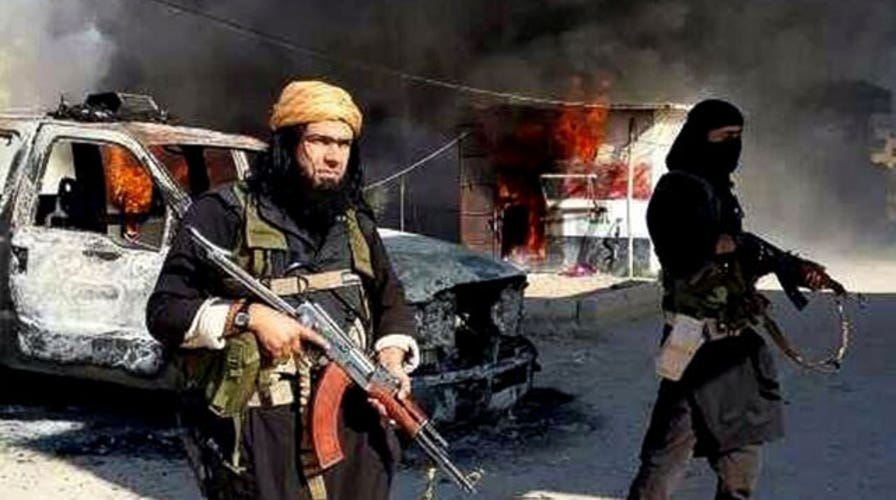Friday’s suicide bombings during midday prayers at two mosques in Yemen that killed more than 100 and injured hundreds more were likely the work of the Islamic State terror group and not Al Qaeda in the Arabian Peninsula (AQAP), Yemeni diplomats told Fox News Friday.
ISIS militants claimed credit for the attacks in the Yemeni capital of Sanaa, as the nation continued its collapse into chaos, terror and death amid fighting between Islam’s two major sects.
The AQAP formally issued denial of responsibility and sources say that historically, AQAP has tried to limit civilian casualties, so the extremely high civilian death toll of Friday’s attacks-- including scores of children-- point to a different organization.
Diplomatic sources described Friday's bombings as the worst mass-casualty attack on civilian life in Yemen in modern memory.
Witnesses said as many as four suicide bombers blew themselves up in the mosques, used by the Shia Muslim Houthi group, which has seized control of the government. The attacks, which also left hundreds injured, were preceded by an assault on a palace where the ousted president is living, according to reports. Yemen has seen escalating violence in recent months between the majority Sunni Muslims, who include Al Qaeda affiliates, and the Shia, who are backed by Iran.
Worshippers were attending noon prayers at the Badr and al-Hashoosh mosques in the capital when the attacks occurred, according to a report on the rebel-owned Al-Masirah TV channel. One witness at the al-Hashoosh mosque, located in Sanaa's northern district, said that he was thrown some six feet away by the blast. Reuters cited medical sources in reporting the death toll, which was revised upward several times. The rebel-owned Al-Masirah TV channel said the casualty figures had reached 137 dead and 345 injured and reported that hospitals were urging citizens to donate blood. It also reported that a fifth suicide bomb attack on another mosque was foiled in the northern city of Saada -- a Houthi stronghold.
"The heads, legs and arms of the dead people were scattered on the floor of the mosque."
Yemeni officials expect the death toll to rise dramatically in the next 24 hours overnight, possibly approaching 150.
"The heads, legs and arms of the dead people were scattered on the floor of the mosque," Mohammed al-Ansi told The Associated Press, adding, "blood is running like a river."
Al-Ansi added that many of those who didn't die in the explosion were seriously injured by shattered glass falling from the mosque's windows. He recalled running for the door along with other survivors and hearing one man screaming, "come back, save the injured!"
ISIS claimed credit for the attack in a tweet on an account associated with the terrorist group. If it indeed carried out the operation, it would mark the terrorist group's first major attack in Yemen.
White House spokesman Josh Earnest said the U.S. had seen no signs of an operational link between ISIS and Friday's attacks. He said the U.S. was investigating to see whether ISIS' Yemen branch has the command-and-control structure in place to warrant its claim of responsibility.
The northern-based rebels, known as the Houthis, seized control of Sanaa last September and in January put President Abdrabbuh Mansour Hadi and the entire government, including Prime Minister Khaled Bahah, under house arrest. The Houthis later declared they have taken over the country.
Meanwhile, al Qaeda's Yemeni branch took control of a southern city after security forces surrendered, Yemeni security officials said Friday.
Al Qaeda militants driving pickup trucks and waving black flags swept through the city of al-Houta, the capital of Lahj province, seizing the main security barracks, the governor's office, and the intelligence headquarters, which houses prisons with al Qaeda detainees.
Security forces loyal to deposed president Ali Abdullah Saleh surrendered to the militants without resistance, officials said. Those who resisted at the governor's office were executed. They spoke on condition of anonymity because they were not authorized to speak to the press.
Saleh was ousted in favor of Hadi in 2011 after mass protests, part of the so-called Arab Spring, but has remained a power-broker in the country. He is currently allied with the Houthis, against whom he fought wars when he was president. The Houthis now control at least nine of Yemen's 21 provinces.
The chaos in Yemen is just the latest blow to the Arab Spring, a movement that began in Tunisia in 2010 and swept much of the Muslim world, promising initially to bring democracy to nations long under the boot of Islamist dictatorships. Although the movement was cheered by the Obama administration, it has proven a failure, and violence has even gripped Tunisia, where two gunmen killed 23 people at a museum Wednesday in an attack for which ISIS claimed credit.
The next critical juncture is a set of mediation talks between Hadi loyalists, the Houthis and other parties, set to be held in April in Riyadh, Saudi Arabia. Until then, analysts foresee a continued, albeit low-intensity conflict, with regional lines being drawn across the country.
Fox News’ James Rosen and the Associated Press contributed to this story.

